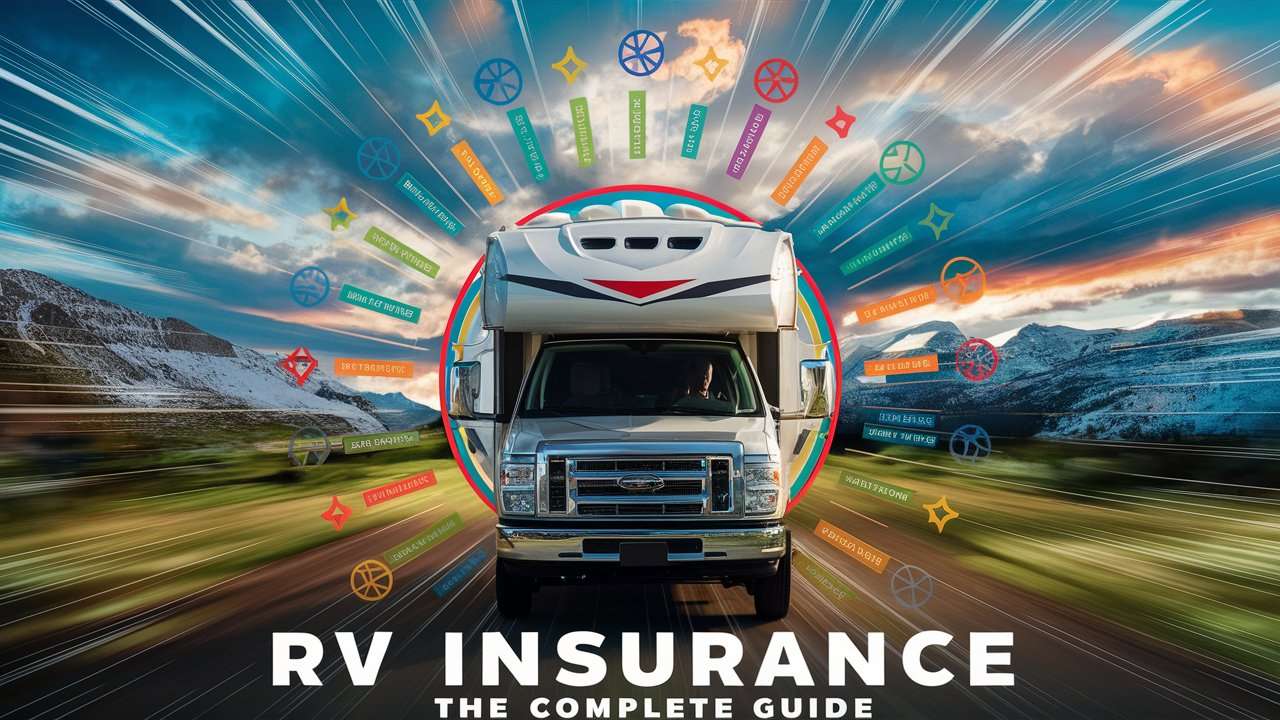The Open Road Awaits!
Imagine this: you’re cruising down the highway, the wind in your hair, the world unfolding before you like a never-ending adventure. The only thing missing from this idyllic scene? An insurance policy that has your back! Welcome to the comprehensive guide on RV insurance, where we turn the daunting task of picking the right policy into a journey of its own. Buckle up, because we’re about to dive into the nitty-gritty of keeping your rolling home safe and sound.

Why RV Insurance?
Understanding the Need for Coverage
Why bother with RV insurance, you ask? Well, consider this: an RV isn’t just a vehicle; it’s your mobile home, your travel buddy, and your second-largest investment after your actual home. Without insurance, you’re not just gambling with your RV; you’re risking your finances, your freedom, and potentially your sanity. Picture this: you’re stranded in the middle of nowhere with a broken axle and no insurance. Not exactly the road trip of your dreams, is it?
Protecting Your Rolling Investment
Your RV is more than just a vehicle; it’s your ticket to adventure. It’s where you store your memories, your comfort, and a significant chunk of your savings. Protecting it with insurance isn’t just about avoiding financial ruin; it’s about ensuring that your investment is safeguarded against mishaps, accidents, and unforeseen calamities. Think of it as a security blanket that lets you roam free without losing sleep over what-ifs.
Types of RV Insurance
Class A, B, and C: What’s the Difference?
RV insurance isn’t a one-size-fits-all deal. The types of RVs🚍Class A, B, and C🚍each come with their own insurance quirks. Class A RVs, the big, luxury buses of the RV world, often require more comprehensive coverage due to their size and cost. Class B RVs, the van-style campers, might have different needs compared to Class C RVs, which are mid-sized and often used by families. Understanding these differences is crucial for getting the right coverage without overpaying.
Towables vs. Motorhomes: Different Strokes for Different Folks
Towables and motorhomes🚍two sides of the RV coin. Towables, like travel trailers and fifth wheels, are hitched to your tow vehicle, whereas motorhomes are self-propelled. This fundamental difference impacts your insurance needs. Towables often require separate insurance from the towing vehicle, while motorhomes need a policy that covers both the vehicle and its contents. Knowing this distinction helps in securing coverage that fits like a glove.

Key Components of RV Insurance
Liability Coverage: The Basics of Legal Protection
Liability coverage is the bread and butter of RV insurance. It protects you if you’re found legally responsible for damage or injury caused by your RV. Imagine you accidentally back into someone’s car at a rest stop. Liability insurance steps in to cover the repair costs and legal fees, ensuring you’re not left holding the bill🚍or worse, facing a lawsuit.
Collision Coverage: Bumper-to-Bumper Security
Collision coverage is your financial bodyguard in the event of a crash. Whether you’re fender-bending or having a full-blown collision, this coverage helps pay for repairs to your RV. It’s especially handy if you’re prone to the occasional “oops” moment or if you’re navigating through less-than-ideal driving conditions.
Comprehensive Coverage: The All-Inclusive Plan
Comprehensive coverage is like the Swiss Army knife of insurance. It protects against non-collision incidents like theft, vandalism, natural disasters, and even animal collisions. Picture a rogue deer deciding your RV is its new playground. Comprehensive coverage steps in to handle the repairs or replacement, so you can get back on the road without a hitch.
Uninsured/Underinsured Motorist Coverage: Safety Net on the Road
Ever met a driver who’s “underinsured” or, worse, uninsured? It’s not a fun experience, and it can leave you high and dry if an accident occurs. Uninsured/underinsured motorist coverage is your safety net, covering the gaps left by other drivers who don’t carry adequate insurance. It ensures you’re not left footing the bill when someone else’s insurance falls short.
Personal Injury Protection (PIP): When the Going Gets Tough
Personal Injury Protection (PIP) covers medical expenses for you and your passengers, no matter who’s at fault in an accident. It’s your ticket to peace of mind, ensuring that medical bills, lost wages, and other related expenses are covered. Think of it as your personal health insurance, but for RV adventures.

Specialty Coverage Options
Full-Timers vs. Occasional Users: Tailoring Your Policy
Are you living in your RV full-time or just using it for the occasional weekend getaway? Your insurance needs will vary. Full-timers need comprehensive coverage that mirrors a home insurance policy, including personal belongings and liability. Occasional users might only need basic coverage with fewer frills. Tailoring your policy ensures you’re not overpaying or underinsured.
Roadside Assistance: Because Stuff Happens
Roadside assistance is your emergency pit crew. Whether it’s a flat tire, a dead battery, or you’re simply stuck in the middle of nowhere, this coverage gets you the help you need. It’s like having a personal concierge who shows up with a tow truck and a toolbox when things go sideways.
Emergency Expense Coverage: For When Life Throws You a Curveball
Emergency expense coverage kicks in when your RV breaks down far from home. It covers costs like hotel stays, meals, and transportation while your RV is in the shop. Think of it as a financial cushion for those moments when you’re stuck in a tiny town with no nearby RV repair shops.
Custom Equipment Coverage: Protecting Your Upgrades
If you’ve decked out your RV with high-tech gadgets or luxurious upgrades, custom equipment coverage protects your investments. Whether it’s a satellite dish, a custom sound system, or a top-of-the-line kitchen, this coverage ensures that your fancy additions are safeguarded against damage or theft.

How to Choose the Right RV Insurance
Assessing Your RV’s Value and Usage
Start by evaluating the value of your RV and how often you use it. Is it a high-end Class A motorhome or a simple pop-up camper? Are you hitting the road every weekend or just a few times a year? Understanding these factors helps you choose coverage that fits your RV’s worth and your travel habits.
Understanding Coverage Limits and Deductibles
Coverage limits and deductibles can make or break your insurance experience. Limits are the maximum amount your insurer will pay out, while deductibles are the amount you pay before insurance kicks in. Balancing these two elements ensures you have adequate protection without stretching your budget too thin.
Shopping Around: Comparing Quotes Like a Pro
Don’t settle for the first quote you get. Shop around and compare quotes from different insurers. Look for policies that offer the best combination of coverage and cost. Utilize online comparison tools or consult with insurance agents to find a policy that fits your needs and your wallet.

The Claims Process
What to Do After an Incident: A Step-by-Step Guide
Accidents happen, but knowing how to handle them can ease the stress. First, ensure everyone’s safety and call for medical help if needed. Document the scene with photos and notes. Contact your insurance company to report the incident and start the claims process. Following these steps ensures you’re prepared and organized when dealing with the aftermath.
Documenting Damage: Photos, Reports, and More
When it comes to filing a claim, detailed documentation is your best friend. Take clear photos of the damage, get a copy of the police report if applicable, and keep receipts for any immediate repairs. Comprehensive documentation speeds up the claims process and strengthens your case with the insurer.
Dealing with Adjusters: Tips for a Smooth Process
Insurance adjusters assess the damage and determine how much the insurance company will pay. Be honest and thorough when providing information. Keep records of all communication and be patient, as the process can take time. If needed, don’t hesitate to ask questions or seek clarification to ensure a smooth claims experience.

Common Exclusions and Limitations
What’s Not Covered: The Fine Print
Every policy has its exclusions, and understanding them is crucial. Common exclusions include damage from wear and tear, intentional acts, and certain types of natural disasters. Reading the fine print helps you know what’s not covered and avoid unpleasant surprises when you need to file a claim.
Seasonal and Storage Limitations: Know Your Policy’s Gaps
Some policies have seasonal or storage limitations. For example, coverage might be reduced or suspended during certain times of the year or while the RV is in storage. Knowing these limitations helps you avoid lapses in coverage and ensures you’re protected year-round.
Saving on RV Insurance
Discounts and Bundles: Save Big with Smart Choices
Take advantage of discounts and bundles to save on your RV insurance. Many insurers offer discounts for safe driving, multi-policy bundles, or membership in RV clubs. Look for opportunities to reduce your premiums while still maintaining robust coverage.
Reducing Your Premiums: Practical Tips and Tricks
Reducing your premiums doesn’t mean skimping on coverage. Consider raising your deductible, installing security devices, or reducing coverage for items you rarely use. These practical tips can help lower your costs without compromising essential protection.
RV Insurance for Different Types of Travelers
Full-Time RV Living: Unique Insurance Needs
Full-time RVers have unique insurance needs that go beyond basic coverage. Policies should include provisions for personal belongings, full-time liability, and possibly even health insurance. Tailoring your coverage to your lifestyle ensures that you’re adequately protected while living on the road.
Weekend Warriors: Coverage for Occasional AdventuresFor those who hit the
road only occasionally, insurance needs are more straightforward. Basic coverage for liability, collision, and comprehensive protection is usually sufficient. Focus on a policy that provides adequate coverage for your infrequent travels without overpaying.
Snowbirds and Seasonal Travelers: Tailored Policies
Snowbirds and seasonal travelers often split their time between locations. Their insurance needs might include provisions for extended periods away from their primary residence and protection in multiple states. Tailoring your policy for seasonal use ensures you’re covered wherever you roam.

Navigating State and Regional Differences
State-by-State Coverage Requirements
Insurance requirements vary from state to state. Some states have minimum coverage mandates, while others may require additional coverage for specific types of RVs. Understanding these state-specific requirements helps ensure you meet legal standards and avoid fines or penalties.
Regional Risks: How Location Affects Your Premium
Your location can impact your insurance premiums due to regional risks like weather conditions, crime rates, or road quality. For instance, RVs in hurricane-prone areas might face higher premiums. Being aware of these regional factors helps in selecting a policy that’s both comprehensive and cost-effective.
Renewal and Policy Changes
When and How to Update Your Policy
Regularly reviewing and updating your policy is essential. Notify your insurer of any changes to your RV’s value, usage, or upgrades. Keeping your policy current ensures you’re always protected against new risks and changes in your circumstances.
Adjusting Coverage as Your Needs Evolve
As your RV lifestyle evolves, so should your insurance coverage. Whether you’re upgrading your RV, changing how you use it, or moving to a new area, adjust your coverage to reflect these changes. Regularly reassessing your needs helps maintain appropriate protection and cost efficiency.
Conclusion: Your Roadmap to RV Insurance Success
Recap of Key Points
In summary, RV insurance is a crucial part of your travel adventures. Understanding the different types of coverage, choosing the right policy, and being aware of exclusions and regional differences helps ensure you’re well-protected. From full-time living to occasional trips, tailored insurance provides peace of mind and financial security on the open road.
Final Tips for Enjoying the Journey with Confidence
Embark on your RV adventures with confidence by selecting a comprehensive insurance policy that suits your needs. Regularly review and adjust your coverage as your lifestyle changes. With the right insurance, you can enjoy the freedom of the open road knowing you’re protected against the unexpected. Happy travels and safe journeys!
People Also Ask
What is the best insurance for RVs?
The best insurance for RVs typically combines comprehensive coverage with affordability. Look for policies that offer robust protection, including liability, collision, and comprehensive coverage. Providers like Progressive, Geico, and State Farm often come highly recommended for their extensive RV insurance options and customer service.
Do you need RV insurance in Canada?
Yes, RV insurance is required in Canada. It provides essential coverage for liability, collision, and comprehensive protection while traveling or parked. Each province may have specific requirements, so it’s important to check local regulations to ensure compliance.
How much is camper insurance in Florida?
Camper insurance in Florida varies based on factors like the type of camper, coverage limits, and your driving history. On average, you might expect to pay between $150 and $500 annually. To get a precise quote, it’s best to compare rates from different insurers and consider discounts for safe driving or bundling policies.
What is RV term?
The term “RV” stands for Recreational Vehicle. In the context of insurance, it refers to a broad category of vehicles designed for recreational purposes, including motorhomes, camper vans, and travel trailers.
What does RV mean in finance?
In finance, RV often stands for “Residual Value,” which is the estimated value of an asset at the end of its useful life. This term is used in various financial contexts, including leasing and asset depreciation.
What is RV in health?
In health, RV commonly stands for “Residual Volume,” which is the amount of air remaining in the lungs after a forced exhalation. It is a crucial measurement in pulmonary function tests.
What is RV in account?
In accounting, RV can stand for “Retained Value,” which refers to the portion of earnings not distributed as dividends but retained for reinvestment or to pay down debt. It represents the cumulative amount of earnings retained in the business.
What is RV in business?
In business, RV can refer to “Residual Value,” similar to its financial context. It is the expected value of an asset at the end of its useful life, which can affect depreciation calculations and investment decisions.
What is the full meaning of RVs in hospital?
In a hospital setting, “RVs” typically stands for “Revascularizations,” referring to medical procedures aimed at restoring blood flow to a part of the body. This can include various surgical and non-surgical methods.
What does RVs stand for in medical billing?
In medical billing, “RVs” often stands for “Relative Value Units.” These units are used to measure the value of medical services and procedures, helping to determine appropriate reimbursement rates for healthcare providers.
Who has the cheapest RV insurance?
The cheapest RV insurance can vary by location, RV type, and individual factors. Providers like Geico, Progressive, and National General are often noted for competitive rates. It’s wise to obtain quotes from multiple insurers to find the best deal for your specific needs.
What does RVC stand for in insurance?
In insurance, “RVC” stands for “Replacement Vehicle Coverage.” This type of coverage provides financial protection for replacing your RV with a similar model if it is totaled or stolen.
Is RV insurance required in Florida?
Yes, RV insurance is required in Florida. The state mandates minimum liability coverage for RVs, similar to other vehicles. Ensuring adequate coverage helps you stay compliant with state laws and protect your investment.
Who is best for motorhome insurance?
The best provider for motorhome insurance depends on your needs and preferences. Companies like Progressive, Geico, and Good Sam Insurance are well-regarded for their motorhome insurance options. It’s beneficial to compare policies and coverage levels to find the best fit for your motorhome.









